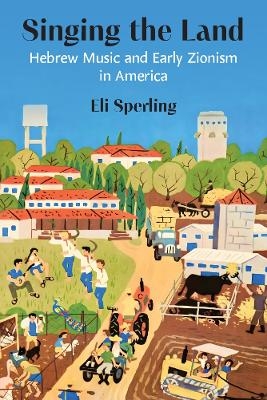
Singing the Land
Hebrew Music and Early Zionism in America
Seiten
2024
The University of Michigan Press (Verlag)
978-0-472-07665-9 (ISBN)
The University of Michigan Press (Verlag)
978-0-472-07665-9 (ISBN)
Offers insights into how and why musical frameworks were central to catalyzing American Jewry’s support of the Zionist cause by the 1940s, parallel to firm commitments to their American locale and national identities.
Singing the Land: Hebrew Music and Early Zionism in America examines the proliferation and use of popular Hebrew Zionist music amongst American Jewry during the first half of the twentieth century. This music—one part in a greater process of instilling diasporic Zionism in American Jewish communities—represents an early and underexplored means of fostering mainstream American Jewish engagement with the Jewish state and Hebrew national culture as they emerged after Israel declared its independence in 1948. This evolutionary process brought Zionism from being an often-polemical notion in American Judaism at the turn of the twentieth century to a mainstream component of American Jewish life by 1948. Hebrew music ultimately emerged as an important means through which many American Jews physically participated in or ‘performed’ aspects of Zionism and Hebrew national culture from afar.
Exploring the history, events, contexts, and tensions that comprised what may be termed the ‘Zionization’ of American Jewry during the first half of the twentieth century, Eli Sperling analyzes primary sources within the historical contexts of Zionist national development and American Jewish life. Singing the Land offers insights into how and why musical frameworks were central to catalyzing American Jewry’s support of the Zionist cause by the 1940s, parallel to firm commitments to their American locale and national identities. The proliferation of this widespread American Jewish-Zionist embrace was achieved through a variety of educational, religious, economic, and political efforts, and Hebrew music was a thread consistent amongst them all.
Singing the Land: Hebrew Music and Early Zionism in America examines the proliferation and use of popular Hebrew Zionist music amongst American Jewry during the first half of the twentieth century. This music—one part in a greater process of instilling diasporic Zionism in American Jewish communities—represents an early and underexplored means of fostering mainstream American Jewish engagement with the Jewish state and Hebrew national culture as they emerged after Israel declared its independence in 1948. This evolutionary process brought Zionism from being an often-polemical notion in American Judaism at the turn of the twentieth century to a mainstream component of American Jewish life by 1948. Hebrew music ultimately emerged as an important means through which many American Jews physically participated in or ‘performed’ aspects of Zionism and Hebrew national culture from afar.
Exploring the history, events, contexts, and tensions that comprised what may be termed the ‘Zionization’ of American Jewry during the first half of the twentieth century, Eli Sperling analyzes primary sources within the historical contexts of Zionist national development and American Jewish life. Singing the Land offers insights into how and why musical frameworks were central to catalyzing American Jewry’s support of the Zionist cause by the 1940s, parallel to firm commitments to their American locale and national identities. The proliferation of this widespread American Jewish-Zionist embrace was achieved through a variety of educational, religious, economic, and political efforts, and Hebrew music was a thread consistent amongst them all.
Eli Sperling is an Israel Institute Teaching Fellow in the Department of International Affairs at the University of Georgia.
Acknowledgements
Preface
Part I: Introduction
Part II: Stephen S. Wise, The Jewish Institute of Religion, Abraham Wolf Binder, and New Palestinian Folk Songs in America
Part III: Solomon Schechter, The Jewish Theological Seminary, the Goldfarbs, and Harry Coopersmith
Part IV: Mordechai and Judith Kaplan, Avraham Zvi Idelsohn and Moshe Nathanson—Voices of Palestine
Part V: The Jewish National Fund--Land Purchases in Palestine, Fundraising in America and Hebrew Music
Epilogue
Bibliography
| Erscheinungsdatum | 15.03.2024 |
|---|---|
| Verlagsort | Ann Arbor |
| Sprache | englisch |
| Maße | 152 x 229 mm |
| Gewicht | 272 g |
| Themenwelt | Kunst / Musik / Theater ► Musik ► Musiktheorie / Musiklehre |
| Sozialwissenschaften ► Soziologie ► Spezielle Soziologien | |
| ISBN-10 | 0-472-07665-5 / 0472076655 |
| ISBN-13 | 978-0-472-07665-9 / 9780472076659 |
| Zustand | Neuware |
| Haben Sie eine Frage zum Produkt? |
Mehr entdecken
aus dem Bereich
aus dem Bereich
Grundbegriffe, Harmonik, Formen, Instrumente
Buch | Softcover (2021)
Philipp Reclam (Verlag)
CHF 12,90
globalisiertes Komponieren
Buch | Softcover (2023)
edition text + kritik (Verlag)
CHF 74,90


